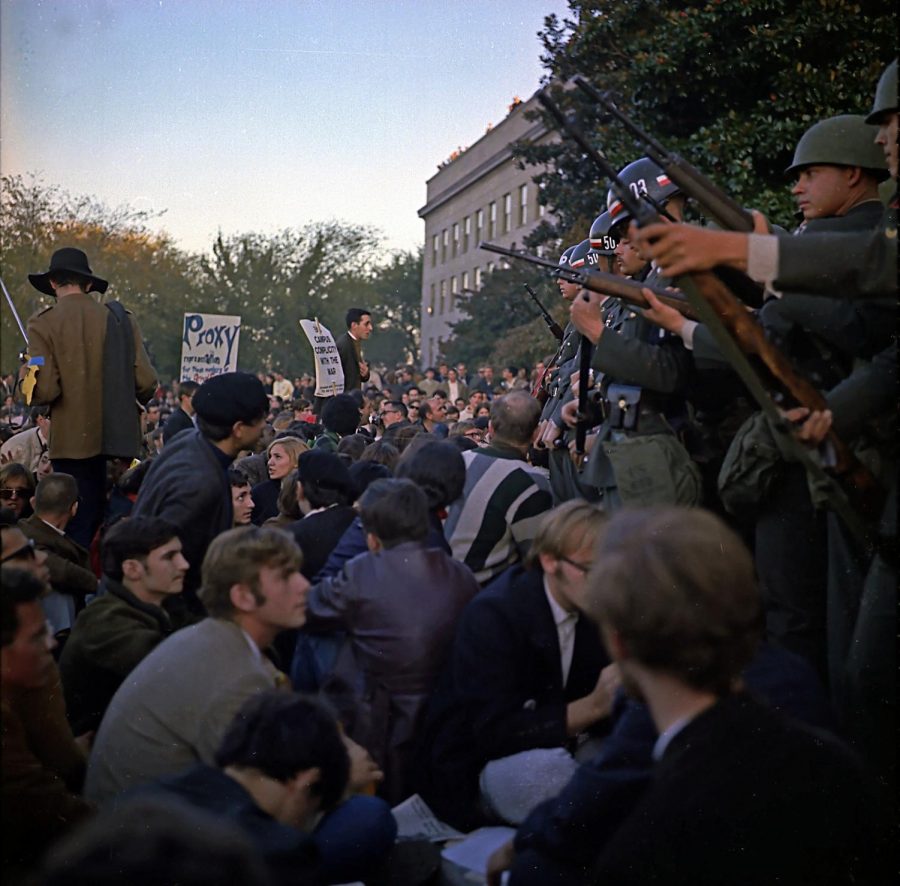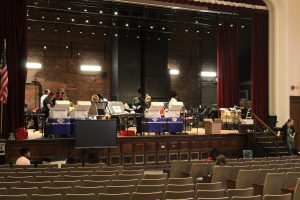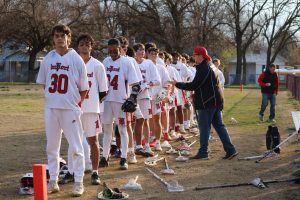“It Could Happen Here” sheds light on how close America is to falling apart
January 26, 2021
“It Could Happen Here.” Four words that are very ambiguous on their own, open to interpretation and with any number of positive or negative implications. A dastardly phrase, simple yet enticing, interesting but frightening. What could happen here? The next American civil war.
That is what the podcast of the name “It Could Happen Here” sets out to say. That America is not immune to falling apart like so many other countries, including those in the Middle East we played a part in destroying. Beginning with one man, Robert Evans, in March of 2019, the podcast flew under the radar for a while, but I remembered it recently in wake of the January 6th coup attempt. In fact, the creator of the podcast has announced a new series in the wake of that insurrection.
The first episode begins with a bit of a surreal piece, talking about the start of an average day in an America where things have halfway fallen apart. The grocery still operates, you live in the same home, but the sounds of gunshots and explosions ring out once in a while on the horizon, and an armed vehicle watches over the large crowd at the grocery store. It sounded impossible when I first heard it, but through the course of the podcast, and every time I’ve thought about that scenario since then, it’s seemed less far-fetched.
Unsurprisingly, the idea for the podcast rose out of the 2016 presidential campaign and election. For four years, it was the most contentious election in recent history. It was overshadowed by 2020 later, but it’s still good to remember how unprecedented it felt at the time. Evans was shaken by violent rhetoric at the National conventions of both parties, though he emphasizes the actions of the right. He reached out to civil war scholars, officers, ex-federal agents and even a former Chief Strategist of the US State Department.
In Evans’ own words, they all responded, and none of them thought the idea of a second American civil war was outlandish. The former Chief Strategist said he didn’t think a civil war was imminent, but he worried about it. They all saw signs that we are drifting to violence. The New York Times and National Review have both published pieces talking about the possibility and its causes.
The idea might seem ridiculous in our day-to-day lives. Our lives seem, for the most part, overwhelmingly stable and peaceful. The idea that something could shake that to the core, destroy that normalcy, seems crazy. It is not. In fact, it is the reality in many places around the world already, and being Americans does not make us immune to those same cycles of violence or hatred for one another. Systems can collapse if the people who normally keep them running start shooting at one another.
Part of the reason we, as Americans, tend to think a second civil war would be impossible is that we view it through the lens of our first Civil War. Seceding states, opposing standing armies in field battles. Something like that is highly unlikely, and not what is meant by a second American civil war. Wars are usually not fought in open field battles anymore. They’re fought with isolated pockets of rebels pulling off ambushes, disrupting supply lines and sowing chaos and fear. A war that includes drones, missiles, tanks, planes, satellites, long-range artillery and more will naturally be a different beast to one of horses, cannons and rifles.
A second American civil war won’t be as simple as red vs. blue states. It’ll probably start when a protest turns violent, and by the time anyone is ready to call it a war, there will almost certainly be more than two sides. It’ll start in the streets of an American city, or perhaps inside government buildings themselves. A crowd will get rowdy, aggressive, and after some time, police or national guard will fire into them, most likely with a mass of supposedly nonlethal weapons. The inciting incident will be when several protesters die. The media will have a field day, and people will debate, argue and yell about who was at fault.
That won’t doom the nation in one fell swoop. It’ll start a chain of further protests. The ingredients for civil war would be just one too many protests turning deadly, or alternatively, one too many armed attacks on police. I felt chills the first time I listened to this podcast this summer, in the middle of the protests surrounding the death of George Floyd and subsequently Breonna Taylor and David McAtee here in Louisville. Evans accurately predicted that Portland would be an epicenter of protests that turned violent, months before Floyd’s death.
A likely second inciting event would be protester on protester violence. At some of these massive protests, counterprotesters turn up, and at least once, someone pulls a weapon and kills people on the other side. The specific events are difficult to predict in the specific strokes, and they don’t matter. What does is that this time, there isn’t time for the inflammation to die down. Enough things go very wrong soon after one another. The divisions deepen, resulting in more protests, and the more protests there are, the more likely things are to turn violent. You get far enough, and the process starts repeating itself.
Where is the line between civil unrest and civil war crossed? Who can tell? There will be fracturing of the parties — the government will likely stay on one side of the war. Republicans will fracture between religious extremists, white supremacists, authoritarians, moderates and more. On the left, socialists, communists, anarchists and more will split as well. There will be multiple parties claiming to be the legitimate government, and multiple claiming to be a new government of the United States.
What’s my point? “It Could Happen Here” is a great podcast. It goes into the reasons behind why the nation is falling apart and does a great job of showing how it could happen. It opened my eyes to a lot of things and helped me understand some of the viewpoints of people on the other side of the aisle.
But my deeper point is this: we need to stop talking about American civil war as if it’s outlandish and impossible. Yes, America is a democracy, and typically a fairly stable one. Being democratic or being American will not prevent us from falling apart. We need to face the reality that we are as susceptible to falling into that violence and hatred as any humans, because if we do not address it, then we cannot guard ourselves against it. Once that goes too far, we’re already living on borrowed time.
Featured image Vietnamprotestors is licensed under public domain.









